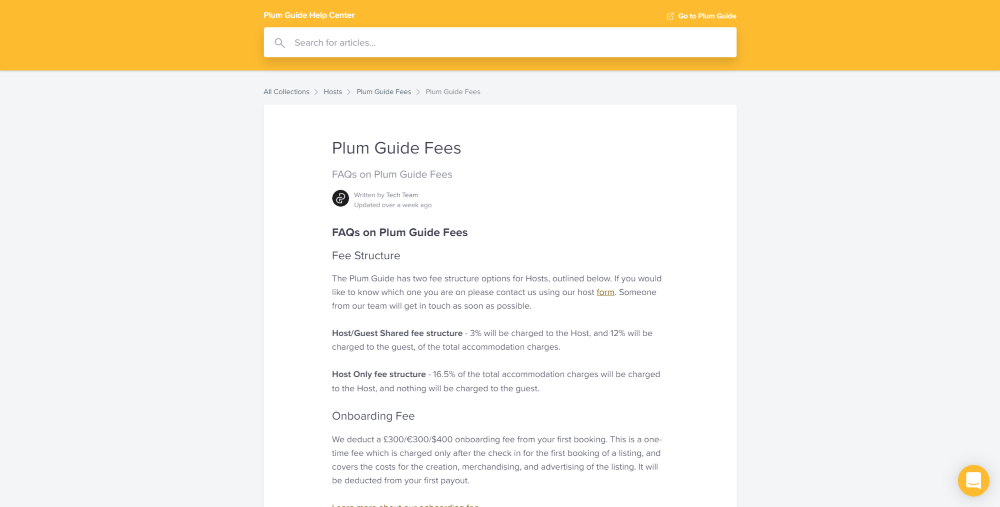How Much Does Plum Guide Charge Hosts?
Listing sites take a percentage of your profit for reservations made through their website or platform. There are many things that go into calculating the total amount of money you earn as a vacation rental host, including daily rate, additional fees you may charge, taxes, host fees and more. How your listing site calculates fees varies from business to business, and often, it even varies within sites as many have multiple fee options.
Plum Guide offers two types of Plum Fees to choose from, the split-fee structure and the host-only fee structure.
Split-fee structure
If you select the split-fee structure, both the host and the guest will be responsible for paying the amount due. The host will be charged a service fee of about 3% of the total accommodation charges plus the applicable sales tax from each booking. That means that the daily rate, guest fees and any other optional charges will be calculated in this price.
Guests will pay an additional service fee plus applicable sales taxes for their booking, which comes to around 12%. However, this percentage can vary based on several booking factors. When checking out, the price of this fee will be calculated in with the total amount and listed with the bill, so there will be no surprises when paying.
This fee structure makes the guest pay most of the necessary fees. While as the host, it may seem nice because you don’t have as much money deducted compared to the host-only fee structure, but guests may think twice about booking due to the added monies onto the total cost. However, if a guest is looking to book on a luxury vacation website, chances are they might not bat an eye when having to pay a bit extra to stay at their dream property.

Host-only fee structure
With the host-only fee structure, you sign up to take on the total cost of the fees yourself. This amount totals about 16.5%-18.5% of the total accommodation charges plus applicable sales tax for each booking. The variance in percentage is based on a number of booking factors and includes cleaning fees and other services fees.
Selecting the host-only fee may sound a bit daunting from the perspective of the property owner or manager because 16%-18% can definitely add up. On the other hand, guests might be pretty happy to see that the price of the place where they’re planning to vacation does not differ that much from the nightly rate multiplied by the number of days. Guests tend to appreciate a reduced number of fees and not having to pay as much for housing, so who knows, maybe paying the fees yourself can encourage more guests through your front door.
Onboarding fees
On your first host payout, which happens when you complete your first booking on Plum Guide, you will be automatically charged a one-time onboarding fee. This is deducted from the total amount paid from the stay. This fee is to cover the costs of testing each home, creating the listing, the Plum Award assets, merchandising and advertising, all of which are provided by the service.

The fee is the equivalent of 300 GBP / 300 EUR / $400 USD plus applicable sales taxes depending on your country. In the case that your home cannot be in-person tested by Plum Guide due to its location, the onboarding fee will not be charged until testing becomes available again.
If during the onboarding process Plum Guide finds that the host has:
- Provided incomplete or incorrect information prior to testing
- Moved the testing time slot with less than 24-hour notice; or
- Decided not to list their accommodation after testing
Then the host will be charged an extra 150 GBP / 150 EUR / 200 USD.
Is Plum Guide worth the money?
To answer the question simply, yes. Having your property listed on Plum Guide is definitely worth the cost. Plum Guide does a lot of the hard work for you, such as building your listing, advertising, and management, which are all covered in the price of the host fees. They are a relatively easy platform to have your listing on due to all these added benefits and services, which of course do not come for free.
In comparison to other listing sites, Plum Guide’s fees come out average, or slightly above the average. Every OTA charges host fees of some sort, so these charges aren’t something you can skip if you want an online listing. If you want to maximize profit, then you should be focusing on receiving the highest number of bookings possible, since paying OTA commissions is quite unavoidable – unless you get your own direct bookings website, of course.